Is Exodus Wallet Safe? Security Features, Risks & What Users Say
Long story short, Exodus Wallet is almost safe to use. Why not completely? It does offer strong pros, but there are also notable cons to consider before using. Further, we will break down how this crypto wallet protects you (or doesn’t?), when it is not the best go-to choice, and how you can strengthen your security on this platform.

Why did Exodus Wallet become a fan favorite?
Exodus Wallet is a software wallet launched in 2016 by the initial Exodus team of two developers who wanted to replace complex blockchain jargon with a clear and user-friendly interface.
The platform supports more than 260 digital crypto assets across desktop, mobile, Web3, Trezor, and Ledger.
Exodus Wallet is positioning itself as a multi-currency crypto wallet for newcomers who are intimidated by complex technical interfaces.
But what about its in-built security measures?
Exodus Wallet security features
These are the security features and safety measures Exodus Wallet offers to its users:
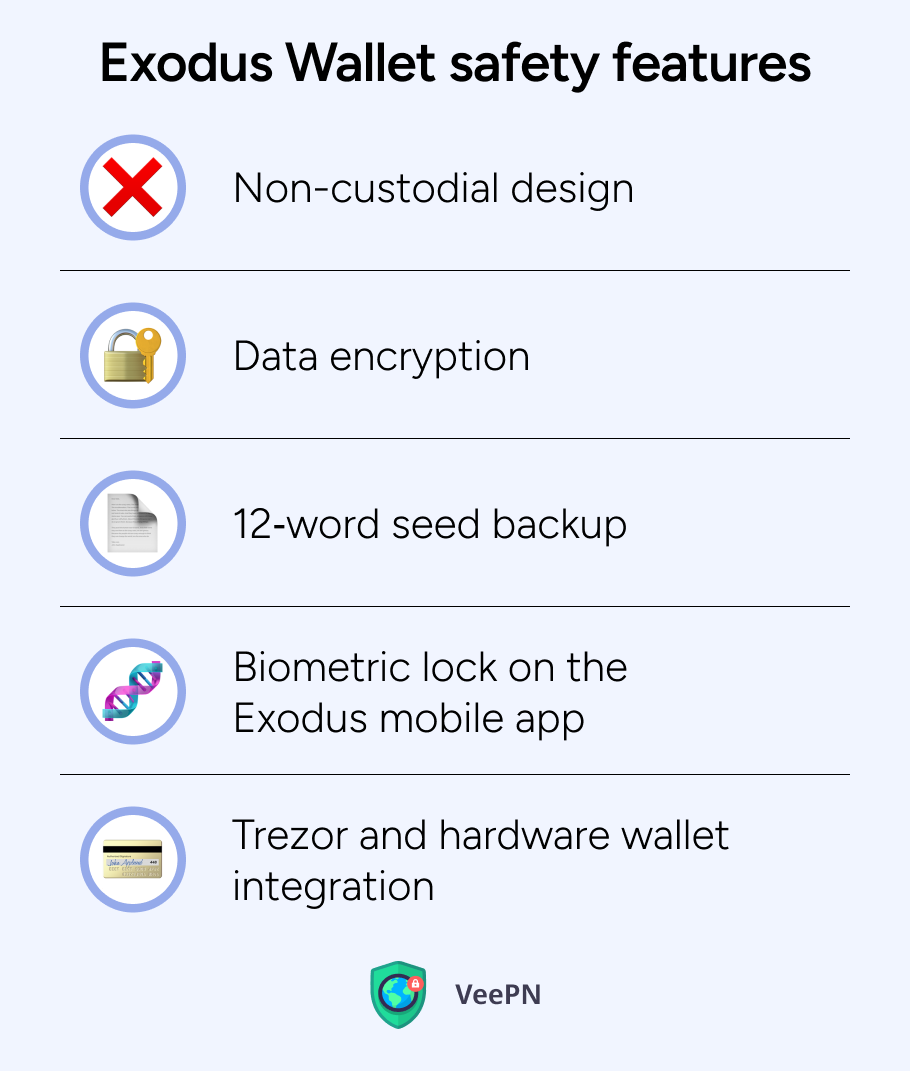
Non-custodial design
Your private keys stay on‑device and nowhere else. Even if there will be some central server hack, no one will be able to siphon your funds. Just keep your operating system updated, and you’ll have your private keys safe from leaking.
Data encryption
U.S. Exodus Wallet encrypts data locally, so a thief that will try to grab your data will see only scrambled gibberish instead of distinctive sensitive financial info. Still, the company doesn’t mention the exact encryption standard they use on their official website.
12‑word seed backup
In other words, your crypto lifeline is 12 words written on paper. This single sheet of paper can restore your funds if you lose your phone. Just write it, laminate it, and keep it somewhere offline.
Biometric lock on the Exodus mobile app
Users can add a fingerprint or their Face ID as a security measure against shoulder‑surfers who might guess your PIN.
Trezor and hardware wallet integration
Plug a Trezor Model T into the desktop client, sign transactions on the device, and keep private keys offline. That hybrid setup combines hot‑wallet convenience with hardware wallets resilience.
Users consider all these features when deciding on whether to use Exodus Wallet or not. Let’s see what are the downsides of this platform in the next part of our Exodus crypto wallet review.
Weak spots of Exodus Wallet to consider
Despite the mentioned Exodus Wallet safety measures, the platform is not totally immune. Here are the main pain points:
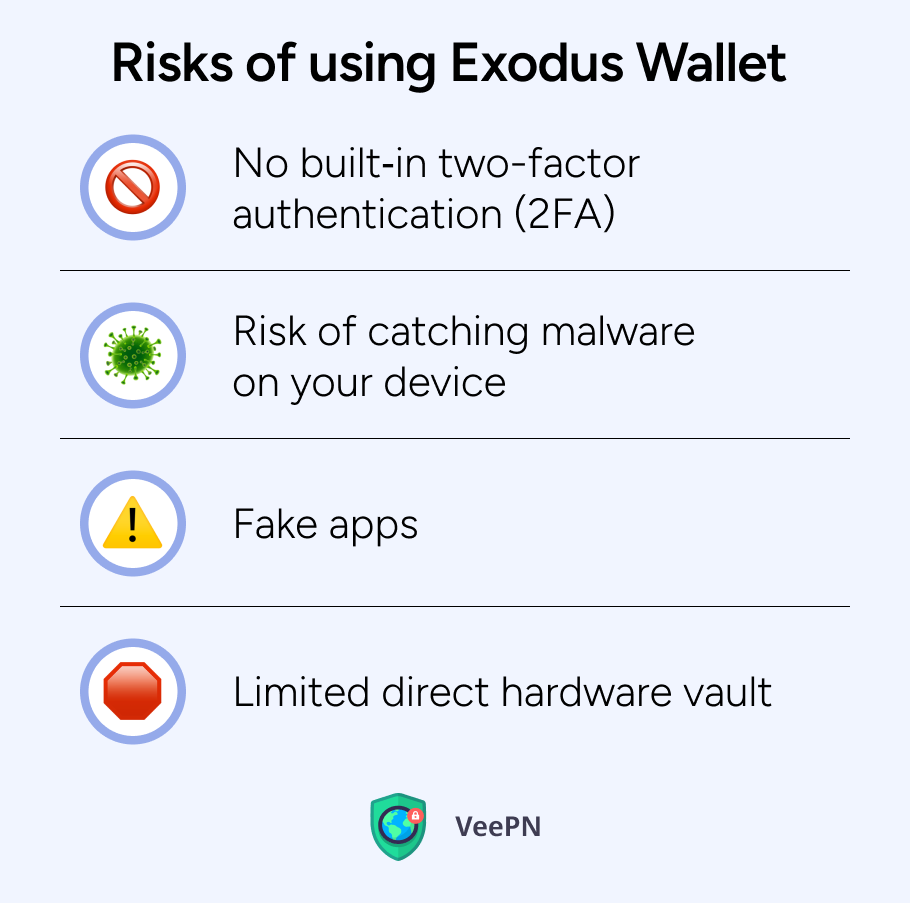
No built‑in two-factor authentication (2FA)
Exodus Wallet lacks implemented 2FA, which means a cracked password and stolen key phrase equals con artists getting full access to your assets.
Risk of catching malware on your device
How is this connected? Fake “update” sites may hide malware that can steal your private keys or passwords as soon as you launch the Exodus Wallet app next time. The Exodus Wallet stated that this is one of the potential reasons why users’ crypto may become vulnerable.
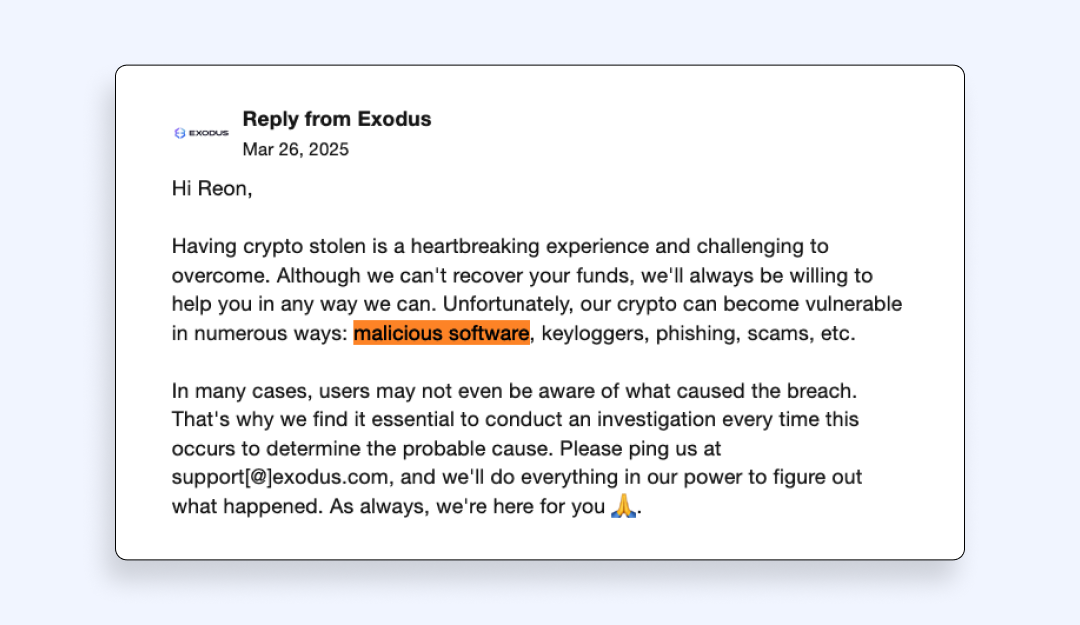
Fake apps
Even unrelated to Exodus Wallet, apps like free tools or browser add-ons can be dangerous if you download them from shady websites or unreliable sources. They may carry hidden malware that hijacks your device and targets your crypto wallet, even if the wallet itself is untouched. One risky install is enough to steal your funds.
A case in point: a malicious npm package disguised as a PDF converter quietly targeted users of Exodus and Atomic Wallets by tampering with their locally installed apps. Once installed, the package searched for specific wallet versions on the victim’s computer and secretly replaced core files with altered code. This allowed attackers to hijack transactions by silently swapping the user’s intended wallet address with their own. Because the malware “patched” existing installations instead of attacking from the outside, it often went undetected and persisted even after the package was deleted. Victims had to fully reinstall their cryptocurrency wallets to remove the threat.
Limited direct hardware vault
Exodus Wallet allows you to connect to a Trezor hardware wallet, adding a layer of protection and letting you keep your private keys offline. But in case you don’t use a hardware wallet like Trezor and rely on Exodus alone, your crypto is still stored on a device connected to the Internet. What is the danger here? It makes your crypto more vulnerable to hacking.
One Reddit user summed up his observations when people claim to be hacked and blaming Exodus Wallet:
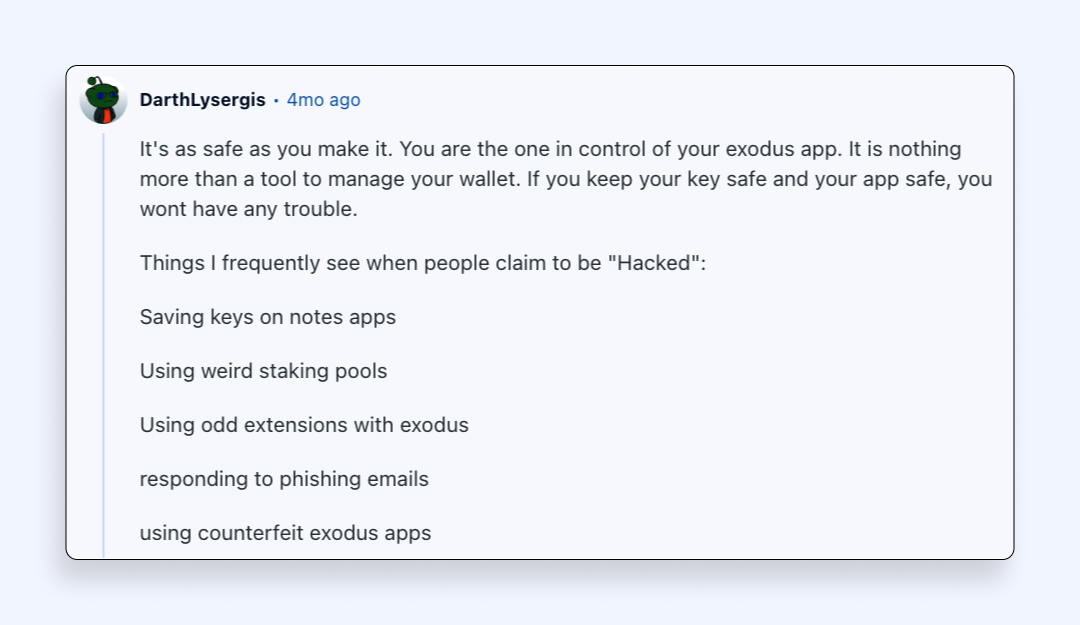
Now, let’s sum things up and look at the advantages and disadvantages of Exodus Wallet before talking about the steps to make your protection stronger.
Exodus Wallet pros and cons
Here is an at‑a‑glance table for better understanding of the whole picture:
| Pros | Cons |
| 👍 Comfortable for beginners The polished clear dashboard shows charts, balances, and earning options in one pane, easing the “first wallet” jitters for a relatively new software wallet user. That convenience can accelerate crypto adoption. 👍 260+ coins and NFTs Whether you hold Solana, DOGE, or other not very famous cryptocurrency, Exodus probably supports it. It is really useful for portfolio diversification without juggling dozens of apps. 👍 Live staking and swapper Users can trade tokens or stake directly within the Exodus Wallet. There is no need to move funds to a crypto exchange. This reduces the risk of exposing your assets to potential crypto hacks or issues that sometimes affect centralized platforms. 👍 Responsive Exodus support 24/7 email plus an in‑app chatbot help users recover stuck transactions quickly. It is especially vital when network fees increase dramatically. | 👎 Always‑online attack surface Viruses, key‑loggers, or remote‑access trojans can exploit a software wallet faster compared to a USB‑isolated cold wallet. 👎 No 2FA safety measure A thief who manages to brute‑force your secure password and a key phrase will walk away with your crypto funds. There’s no additional verification method to stop them. 👎 Not fully open-source cryptocurrency wallet Independent developers can’t fully inspect every line of Exodus Wallet’s code, so users must trust Exodus’ internal audits. 👎 Fees on swaps Swapping crypto inside Exodus is indeed easy. But it comes with a hidden cost of about 2% fee on less-traded coins. That’s higher than you’d pay using a decentralized exchange. |
Having that covered, let’s cover best practices that can help keep your crypto safe when using Exodus Wallet.
Tips to keep your funds safe on Exodus Wallet
Even the best security features cannot fix users’ unsafe online habits. Follow these steps to give your crypto assets the protection:
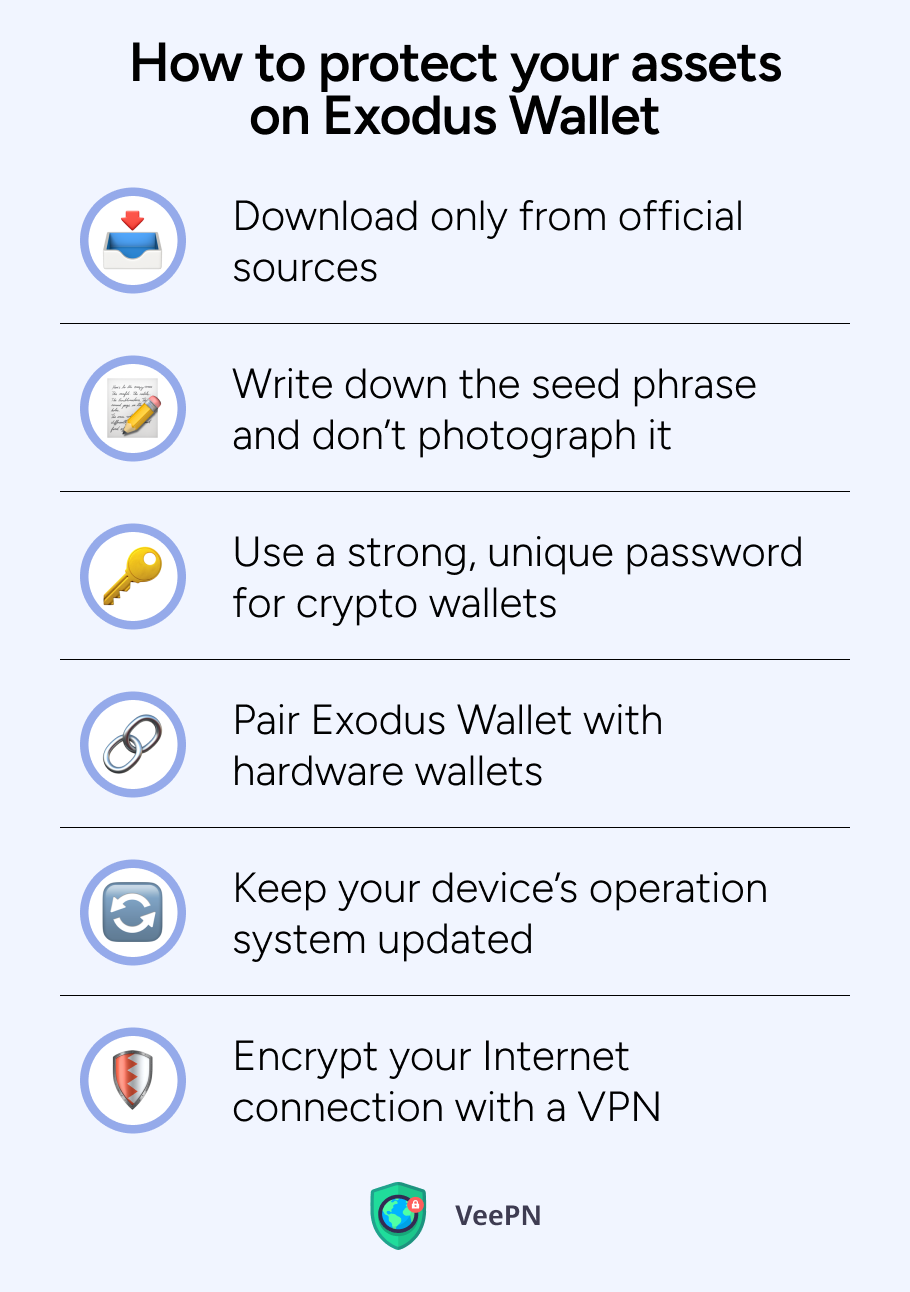
Download only from official sources
Always download the Exodus software wallet from exodus.com (watch for the padlock icon before clicking). As we said before, fake sites that offer “updates” often carry hidden malware that may steal your private keys or passwords.
Write down the seed phrase and don’t photograph it
Don’t write your seed phrase in the notes on a device and never upload this phrase to cloud storages. The best way is to write them on paper, and then store a copy in a safe place. Don’t take photos of it, as digital photos can leak during a device sync or in case you have malware installed.
Use a strong, unique password for crypto wallets
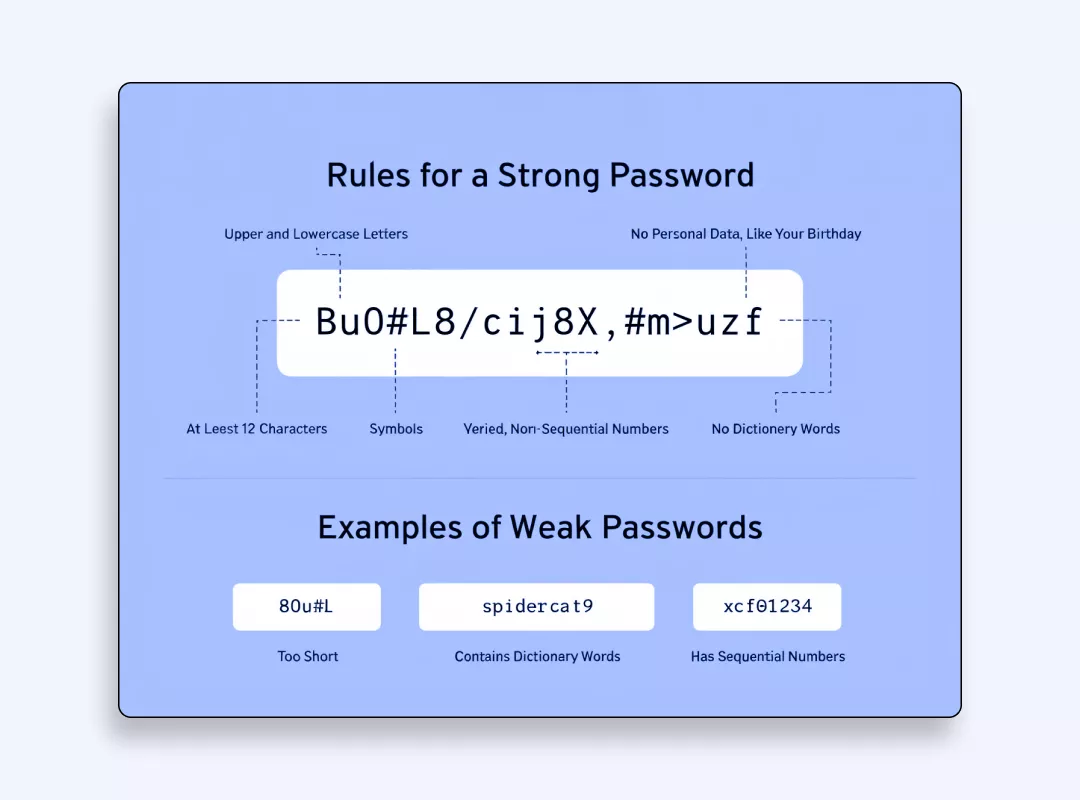
Imagine a 16‑character mix of letters, numbers, and symbols. This is a truly secure password. Never re-use your passwords for online wallets because it makes brute‑force attacks easier for cybercriminals.
Pair Exodus Wallet with hardware wallets
Consider connecting a Trezor or Ledger. Such a hardware wallet integration will keep your private keys offline and you will be able to sign every transaction on the device. This will turn Exodus into a desktop wallet or your mobile wallet app with better control over your assets.
Keep your device’s operation system updated
Always install security patches as soon as there are new versions available, and don’t use any shady software. Most “Exodus wallet hacked” stories start with an infected device, not the wallet code itself.
Encrypt your Internet connection with a VPN
A reliable VPN hides your real IP address, doesn’t allow snoopers to track your actions on public Wi-Fi, and prevents DNS tampering when you send coins.
But not all VPN providers are the same. Free VPNs might sell users’ browsing logs to third parties to keep their services running. Additionally, they usually show tons of ads, impose bandwidth limits, and can even inject malware into your device. Therefore, if you want to keep your private keys safe and maintain decent online protection, don’t use no-cost VPNs. Choose a reliable and trustworthy VPN like VeePN.
VeePN for safe crypto activity
A wallet application guards the keys on your device. But the Internet is the place where cybercriminals can attack you. Here is how VeePN сontributes to your crypto protection:
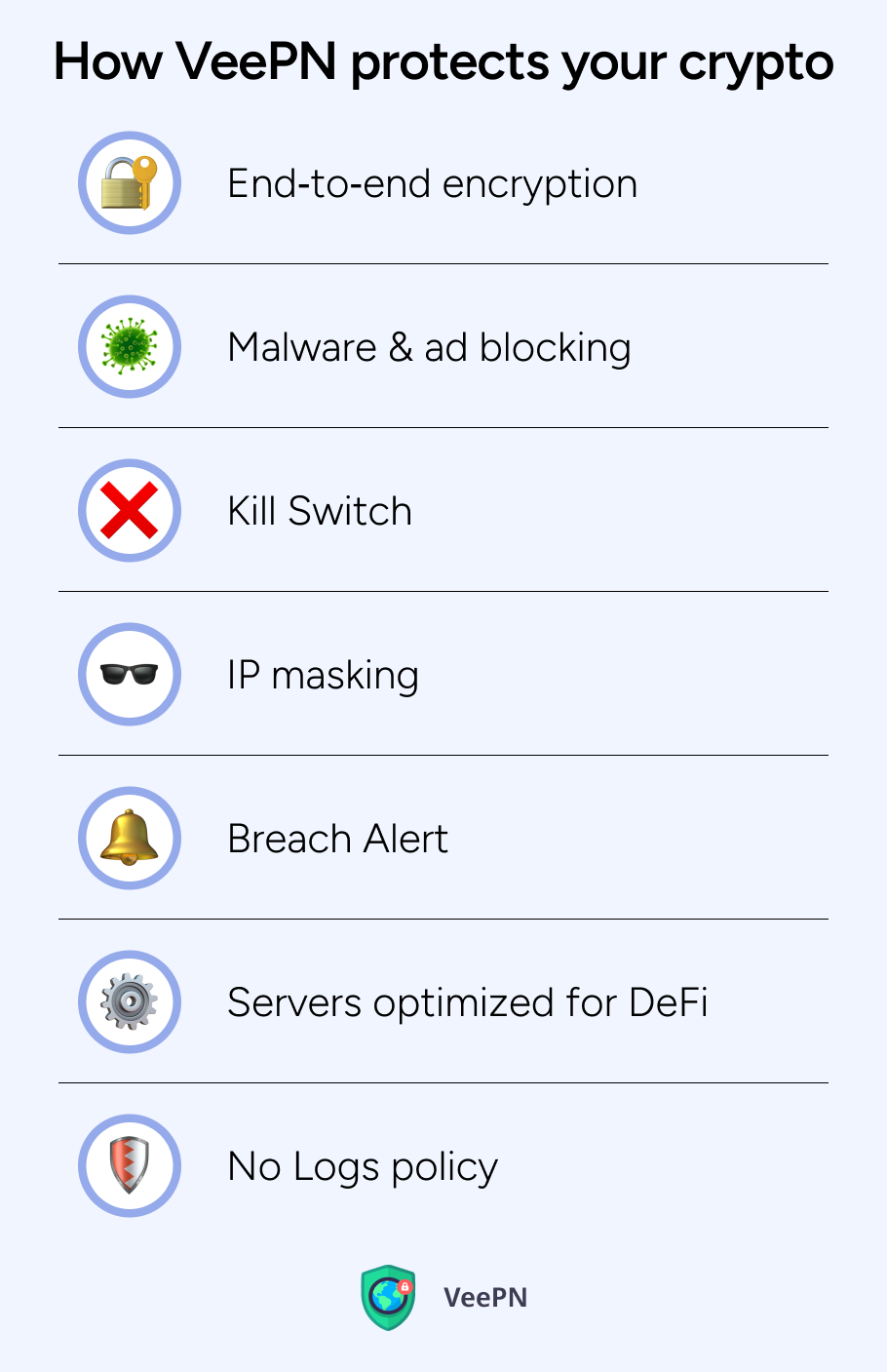
End‑to‑end encryption
VeePN tunnels your traffic with the military-grade AES‑256 encryption standard. This way, even if a hacker is sitting on public Wi‑Fi with you, they will see only some gibberish instead of your outgoing transaction.
Malware & ad blocking
The built-in NetGuard filters malicious domains and stops pop‑ups with “Exodus upgrade” from a shady website before they tempt you to download a trojan under the mask of an update file.
Kill Switch
If your VPN connection glitches or drops, VeePN automatically cuts the whole Internet access to your device. This way, your unencrypted data will never leak during your crypto operations.
IP masking
Each session rotates an anonymous address. VeePN keeps your real whereabouts away from DEX trackers and reduces the fingerprint that ad networks tie to your user interface.
Breach Alert
VeePN scans dark‑web dumps for the email tied to your Exodus account. If crooks publish it on a dark net after a potential Exodus data breach or other crypto hacks, you get an instant notification to change credentials.
Servers optimized for DeFi
VeePN’s fast and low‑latency nodes reduce lag during swaps or staking. This is useful for users who regularly trade through Exodus’ multi-currency crypto wallet.
No Logs policy
VeePN follows a strict No Logs policy. It means we never record your browsing history, IP address, or online transactions. In the case of crypto wallets, we don’t store your logins, passwords, or token swaps information that later on can be exploited by third parties or surveillance agencies.
Try using VeePN without any risks with a 30-day money-back guarantee.
FAQ
No direct answer here. Both wallets do a good job, but Exodus lets you keep complete control over your private keys, while CoinBase stores keys on its servers. If you’re comfortable managing backups yourself, Exodus can feel safer. If you prefer a company to guard your keys, CoinBase might be the better fit. Always weigh convenience against self‑custody risk.
Not exactly. These platforms are used for different purposes. The “safety” depends on which features you value most. Exodus Wallet isn’t an exchange, so it doesn’t hold large, centrally pooled funds. Add its multi-currency support and the option to run everything from a local desktop app or mobile app, and you can avoid many exchange‑level breaches. Still, Binance offers extra account‑level protection methods like 2FA.
It has no multi-factor authentication. But the biggest Exodus Wallet drawback is that it’s online by default. Unlike air‑gapped hardware, hot wallets, especially complex software wallets, can be hit by malware on your device. Pairing Exodus with a hardware wallet closes most of that gap.
Security starts with you: choose a strong password, write and save the 12‑word key phrase on paper, and keep your operating system updated. With those basics, Exodus’ encryption and local key storage give you full control and a solid defense against remote attackers.
Yes. Many users and independent blogs have published an Exodus wallet review since 2016. They praised its ease of use in crypto space. It supports hundreds of digital currency types, and only you hold the recovery phrase. Though legit doesn’t mean “safe”. Read the article to know more about Exodus Wallet’s safety.
VeePN is freedom
Download VeePN Client for All Platforms
Enjoy a smooth VPN experience anywhere, anytime. No matter the device you have — phone or laptop, tablet or router — VeePN’s next-gen data protection and ultra-fast speeds will cover all of them.
Download for PC Download for Mac IOS and Android App
IOS and Android App
Want secure browsing while reading this?
See the difference for yourself - Try VeePN PRO for 3-days for $1, no risk, no pressure.
Start My $1 TrialThen VeePN PRO 1-year plan








